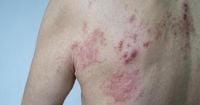As researchers continue to unravel the complexities of Alzheimer’s disease, a growing body of evidence suggests that certain viral infections may play a significant role in triggering the onset of this debilitating condition. Among these, the varicella zoster virus (VZV), responsible for chickenpox and shingles, and the herpes simplex virus 1 (HSV-1), associated with oral and genital herpes, have come under scrutiny.
Dr. Manjari Tripathi, head of neurology at the All India Institute of Medical Sciences (AIIMS) in New Delhi, highlights that a staggering 80% of the population carries HSV-1, while VZV is present in 95%. This prevalence raises critical questions about the potential connection between these viruses and Alzheimer’s disease.
Despite extensive research into the neurodegenerative disorder, the exact causes of Alzheimer’s remain elusive. However, scientists have hypothesized that inflammation in the brain, possibly triggered by viral infections, could lead to the abnormal accumulation of amyloid beta and tau proteins, which are hallmarks of the disease. Evidence supporting this theory includes the discovery of HSV-1 genetic material within amyloid plaques.
A 2022 study further complicates the narrative by revealing that repeated head injuries can reactivate dormant HSV-1 infections. Given that concussions are known risk factors for Alzheimer’s, this finding suggests a potential link between trauma and viral activity in the brain.
Vaccination appears to be a promising avenue for reducing Alzheimer’s risk. A large-scale “natural experiment” involving health data from 280,000 older individuals in Wales showed that those vaccinated against shingles were 20% less likely to develop dementia. This significant statistic underscores the potential protective effects of vaccines.
“While we may not have all the answers yet, it would be good to get vaccinated with all available vaccines,” Dr. Tripathi emphasizes. She points out that many adults mistakenly believe vaccines are only necessary in childhood, neglecting the importance of receiving flu, pneumonia, and shingles vaccines in later life.
The viral hypothesis is not the only theory being investigated. Researchers are also exploring the gut-brain axis hypothesis, which posits that changes in the gut microbiome can increase intestinal permeability, allowing harmful molecules to reach the brain and cause inflammation. Another area of interest is autophagy, the cellular process responsible for disposing of damaged components, which may be disrupted in Alzheimer’s patients.
Despite the exploration of these various triggers, current therapies for Alzheimer’s primarily focus on monoclonal antibodies designed to remove clumped proteins from the brains of affected patients. At least three therapies have been approved by the U.S. Food and Drug Administration (FDA), although they cannot reverse memory loss. A phase III study of donanemab revealed that it could slow cognitive decline in early Alzheimer’s patients by 35.1% over 76 weeks. However, these drugs can cause small bleeds in the brain, raising concerns about their safety.
“There are new therapies that have come out in the market, but these are terribly expensive,” Dr. Tripathi notes. “What we need now are cheaper therapies that can prevent the disease.”
As the research landscape evolves, the implications of these findings could reshape our understanding of Alzheimer’s disease and how to combat it. In particular, the potential link between viral infections and the development of Alzheimer’s warrants further investigation.
Shingles, also known as herpes zoster, is a painful infection that can have long-lasting effects. The infection typically begins with tingling pain, headaches, and fatigue, followed by a painful rash of fluid-filled blisters. While most individuals recover fully, some may experience post-herpetic neuralgia (PHN), a condition characterized by severe pain that can persist for months or even years after the rash has healed.
According to the National Health Service (NHS), shingles is caused by the varicella-zoster virus, the same virus responsible for chickenpox. After recovering from chickenpox, the virus can remain dormant in the body for years, only to reactivate later in life when the immune system is weakened due to factors such as age, stress, or illness.
Shingles is not contagious in the traditional sense, but it can be transmitted to individuals who have never had chickenpox, leading to an outbreak of that illness. The NHS advises those with shingles to avoid contact with pregnant individuals who have not had chickenpox, as well as newborns and individuals with compromised immune systems.
Fortunately, a shingles vaccine is available on the NHS for individuals aged 70 to 79, as well as those aged 50 and over with a severely weakened immune system. The vaccine is designed to reduce the risk of developing shingles, and if a vaccinated individual does contract the virus, the symptoms are typically milder.
The recent findings regarding the shingles vaccine's potential to lower dementia risk further emphasize the importance of vaccination in older adults. As health authorities continue to promote vaccination, understanding the intricate connections between viral infections and neurodegenerative diseases like Alzheimer’s could lead to new preventive strategies and improved health outcomes.
In summary, the intersection of viral infections and Alzheimer’s disease is an area of increasing interest and research. With the potential for vaccines to play a protective role, public health initiatives may need to adapt to ensure that older adults are adequately protected against both shingles and other viral infections. As the quest for effective Alzheimer’s therapies continues, the findings surrounding viral infections may offer a new pathway toward understanding and potentially mitigating this devastating disease.




